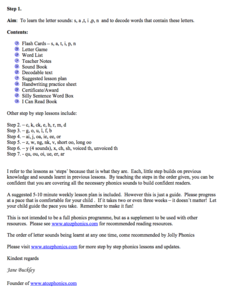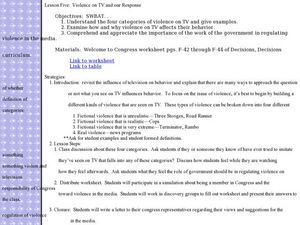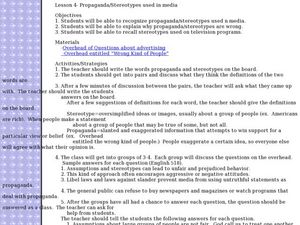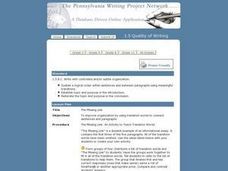Florida Center for Reading Research
Vocabulary: Word Meaning, Oh My Word!
Ever come across an unfamiliar word while reading and can't decipher its meaning? Use a worksheet and graphic organizer that tracks and helps bring meaning to unknown words as learners read a text. A worksheet and graphic organizer come...
Curated OER
Twenty-Five Great Ideas for Teaching Current Events
Teaching current events can be an amazingly-rewarding part of your teaching week. This resource presents twenty-five ways to incorporate current events into your curriculum. It offers some outstanding ideas, such as providing your...
Agriculture in the Classroom
Pumpkins... Not Just For Halloween
Celebrate fall with four pumpkin themed hands-on activities! After learning about pumpkins, scholars complete two activity sheets that reinforce estimation and word problems. They then plant pumpkin seeds and bake a pie in...
Curated OER
Healthy Body Image: A Lesson Plan for High School Students
How does your class view themselves? High schoolers explore body image through a series of four activities. Groups collaborate to examine the changes we experience as a part of growing up, how the media influences body image, and healthy...
K12 Reader
Antonyms are Opposites
Knowing the opposite of your chosen word is a great step in improving your word choice. Young readers select an antonym from the provided word bank to complete a series of 14 sentences.
Curated OER
Lesson Plan Outline for Rainbow Science
Young scientists study light reflection and refraction as they determine the critical angle, the rainbow angle, and color separation in rainbows. Teams record the data they collect in a shared spreadsheet and discuss results with the class.
A to Z Teacher Stuff
My Sound Book
Work with learners on a handful of letter sounds with a helpful language arts packet. The packet focuses on letters s, a, t, i, p, and n with tracing lessons and flash cards.
Curated OER
Acrobatic Clown
In this science investigation worksheet, students learn about balancing points and center of gravity by making a cardboard acrobatic clown using the directions and pattern provided.
Curated OER
Violence on TV and Our Response
Students examine violence on television. For this media awareness lesson, students discuss the types of fictional and realistic violence shown on American television. Students participate in a Congressional simulation activity on the...
Curated OER
Photodocumentation: Promoting Environmental Education Through the Development of Visual Literacy Skills
Students construct a photo document on their selected topic and use at least twelve photographs in their photo document. One must be of the authors. Additionally, they must write five interactive questions which help viewers interpret...
Florida Center for Reading Research
Letter Recognition: Poetry Pen
It's always nice to have a great idea and all the tools to make it happen. The class can use these nursery rhyme and alphabet cards to teach each other letter recognition and letter sound correspondence. There is a full set of alphabet...
NOAA
Biological Oceanographic Investigations – What's in That Cake?
Have you ever tried to find hidden items in a picture when you don't know what you are looking for or how many things are hidden? A lesson applies that same concept to sampling the deep sea habitats. Participants must first create a...
Curated OER
Discovering Peace
Students explore vocabulary related to peace. In this peace lesson, students define the word "peace" and create a poem about peace. Students create a "peace quilt" as a follow-up activity.
Curated OER
Discovering National Parks
Students work to preserve American National Parks. For this environmental activism lesson, students research the history of the national parks and determine why they were created. Students then focus on protecting the land, using it for...
Curated OER
Historical Figure: A Monologue
Fourth graders develop their speaking skills. In this monologue lesson, 4th graders watch their instructors model a monologue regarding Abraham Lincoln. Students apply these skills as they research a historical figure from their state...
Curated OER
Introducing Elections Unit
Young scholars discover the political parties of our country by participating in a role playing activity. In this U.S. Government lesson, students visit several different classrooms that each represent one of the political parties...
Curated OER
Propaganda/Stereotypes Used in the Media
Students write a character sketch on a television character who they feel is a stereotype. In this propaganda/stereotype lesson, students discuss the definition of the terms and ways that the media uses both. Students relate...
Curated OER
Career Planning and Research
What do you want to do when you finish school? Most high schoolers have an idea of what they'd want to do, but little idea of how to achieve this goal. After researching a career of their choosing, learners identify qualifications,...
Curated OER
History Personified
In 1856 Congressman Preston Brooks of South Carolina beat Senator Charles Sumner of Massachusetts over the head with a cane. This event, which highlighted the acrimonious debate over the expansion of slavery, is the focus of a paper...
Curated OER
The Missing Link
What is the missing link? Provide your class with this incomplete essay (it's missing transition words), and have writers place words from the transition word bank into the essay. Also, since only three of the five paragraphs are...
Curated OER
Free-Writing Exercise
Use the suggested question "What does it mean to be a citizen?" to prompt your writers. After they free-write for five minutes, have them trade papers with another classmate. For the next five minutes, class members respond to the new...
Florida Center for Reading Research
Comprehension: Monitoring for Understanding, Simple Summary
Can your class sum up a text in a few sentences? Help them build this skill by starting nice and slow. For this summarizing activity, the teacher marks the main ideas with sticky notes. Learners read and reread the text, pausing at the...
Florida Center for Reading Research
Phonological Awareness: Onset and Rime, Quick Pick
What does it begin with? In this engaging phonics game, small groups study onset and rime using picture cards. Groups take turns as one player draws three cards from an overturned pile, placing them face-up on the table. They silently...
Meadows Center for Preventing Educational Risk, University of Texas at Austin
Sight Word Fluency Lists 46 to 60
Reading takes place one word at a time. Increase scholar word recognition fluency and create better readers with sight word fluency lists. Readers continue to practice each list until they prove mastery.

























